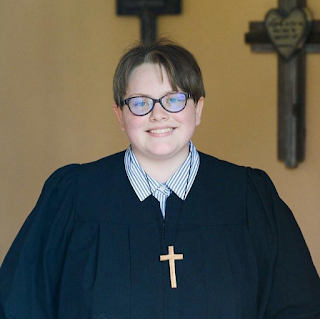I’ve seen a lot of conversation circling on social media
that is both ageist and ableist. It is
important to recognize the Divine image reflected within each person. Every
person has sacred, intrinsic worth, and a valued part of our human community. Turning
to the Gospels, we find that whatever we do for another, we do for Jesus.In
this time of uncertainty, we must seek
to be gracious and compassionate. One way we can do that is through active
listening, and social distancing. “For I
was hungry and you gave me food, I was thirsty and you gave me something to
drink, I was a stranger and you welcomed me,
I was naked and you gave me clothing, I was sick and you took care of
me, I was in prison and you visited me. Then the righteous will answer him, ‘Lord,
when was it that we saw you hungry and gave you food, or thirsty and gave you
something to drink? And when was it that we saw you a stranger and welcomed
you, or naked and gave you clothing? And when was it that we saw you sick or in
prison and visited you?’ And the king will answer them, ‘Truly I tell you, just
as you did it to one of the least of these who are members of my family, you
did it to me.” ( Matthew 25:35-40 NRSV)
For many in the disability community, there is a heightened
awareness about social distancing, medical isolation, and the danger of
community spread illness. It is a matter of life and death for
immunocompromised and chronically ill persons. Our community worries about
whether there will be access to health care, medication, therapy services, and
life sustaining medical supplies. Disabled and chronically people will be
disproportionately affected by the closure of schools, work places, businesses,
and delivery services. The closure of public spaces brings with it a loss of routine and structure that many
disabled people require to flourish. It may mean loss of social interactions
with key people like therapists, health care providers, caregivers, delivery
services, co-workers, classmates and friends. As public schools, universities and
daycares close, disabled students may not receive their accommodations or
therapy services. Yes, it is important to talk about disability rights in the
middle of a global pandemic. It won’t just be Covid-19 that devastates the
lives of disabled people, but the loss of jobs, structure, education, health
care, routine, and essential resources. The life experience of persons with
disabilities is rarely considered by able bodied, neurotypical persons. Perhaps
this period of the world turned upside down may allow us to pull back the veil,
and have much needed conversations.
Prior to Covid-19, disabled persons asked to work from home
or take classes remotely. They were told it is not possible to grant such
accommodations. It is disappointing to see accommodations fought for years,
widely available overnight. If the accommodations are required for a small
group of people, then it is too expensive, impossible or time consuming. Yet
when the entire public requires it, suddenly it is possible. It reveals to us, accessibility
is possible, but is often denied to our community. Churches, workplaces,
schools, and community groups are stepping up to meet online. Yes, Church, you
are capable of creative, accessible worship. I just wish a global pandemic
isn’t what made you take accessible virtual and physical spaces seriously. I
hope when this global pandemic ends, we will continue to offer online
communities. There is a great need for the human community to exist both in
person and digitally. It allows us to connect with a vast audience of people.
For those not familiar with the disability community, here
are some ways you can love your disabled neighbor as yourself.
1. Stay home if you can.
2. Wash your hands often with soap and water
for 20 seconds.
3. Practice social distancing by
remaining 6 feet apart.
4. Don’t hoard hand sanitizer,
distilled water, alcohol prep pads, or masks.
5. Buy what you need and leave enough
for someone else.
6. Please take Covid-19 seriously, it
will devastate our community, many of whom cannot social distance, reach the
sink to wash their hands or require the assistance of home health workers.
There is no guide book for these unprecedented times we find
ourselves in. We have to take things hour by hour as our lives rapidly change.
But we can continue to find our hope found in Jesus who often imagined a better
world. In the first century Mediterranean world Jesus lived in, illness, disease
and death were common. In fact, you can find many passages in the Hebrew Bible
about community health. There was a concern for the entire wellness of a
community, not just individual wellness. In our 21st century world, I think
many have lost a sense of consciousness about communal concern. Our thinking
cannot be self-centered, but Christ centered. Jesus commands us to love God
with all of our mind, heart, and strength. I encourage you to find a way to be
connected with a faith community whether through live streaming, podcasts,
Zoom, or virtual small groups. The second commandment is to love your neighbor
as yourself. The best thing we can do is stay home, and practice good hygiene.
Flatten the curve, the people you love in your life will thank you. Practicing
social distancing is a radical act of loving your neighbor as yourself.
My name is Sara Martin. I am currently a ministry candidate in the United Methodist Church as I pursue ordination as an Elder. I will attend seminary at St. Paul School of Theology in the fall. If you’re interested in talking theology, pop culture, or disability studies, hit me up. I enjoy being active on social media and participating in online conversations.


No comments:
Post a Comment